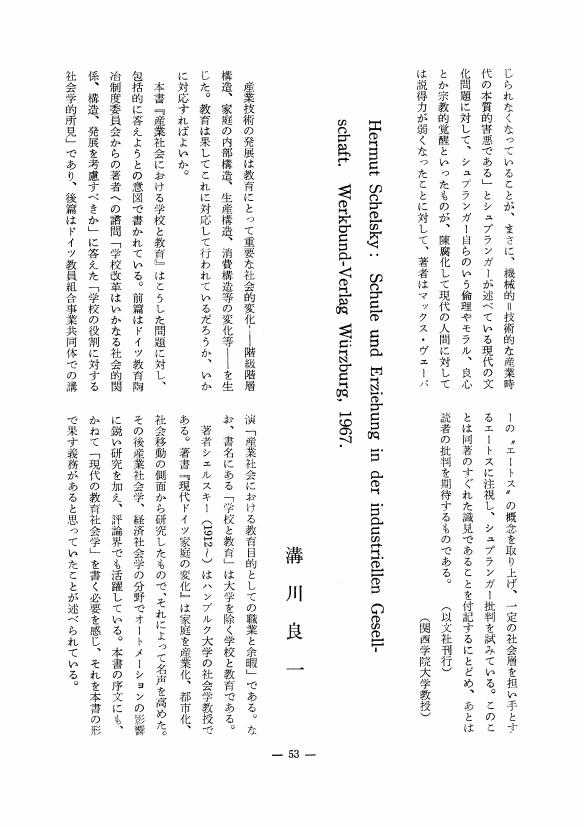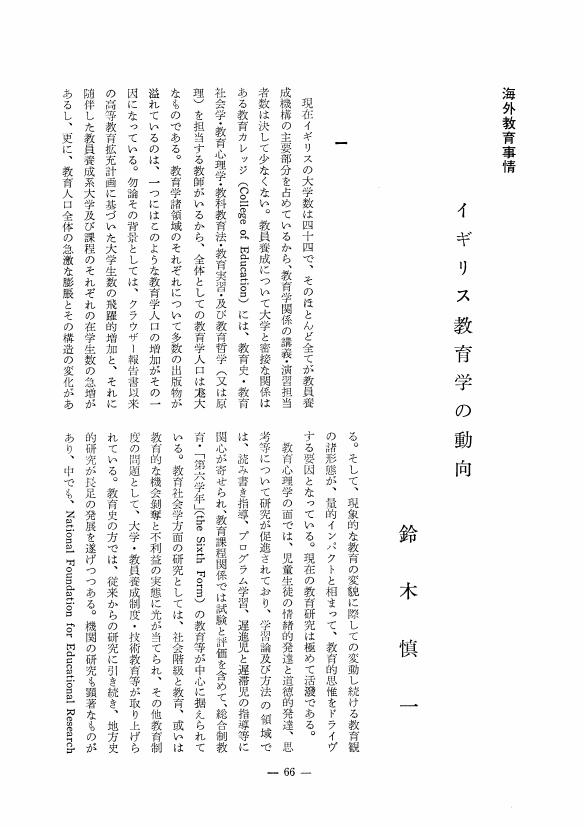1 0 0 0 OA トマス・ジェファソンの教育思想におけるデモクラシーの概念
- 著者
- 山口 恒夫
- 出版者
- 教育哲学会
- 雑誌
- 教育哲学研究 (ISSN:03873153)
- 巻号頁・発行日
- vol.1974, no.30, pp.1-15, 1974 (Released:2009-09-04)
- 参考文献数
- 58
The concept of “democracy” which was inherent in the republicanism of Thonas Jefferson (1743-1826) at the time of independence and most of all in his educational thought, had at its basis a strong belief in “reason” and “morality” of man who possesses the right of “self-government” as a natural right, and it included originally some kind of moral meaning.According to Jefferson the function of public education was to cultivate “reason” and “moral sense”, universal faculties and endowments peculiar to man, and thus to improve the capability of man for self-government. It consisted on the one hand of elementary ebucation with the purpose of making autonomous personalities out of the people by fostering their autonomous judgment through spreading widely knowledge and the art of reading and writing ; on the other hand it consisted of secondary and higher education with the purpose of training trustworthy leaders ; students with a high degree of morality and intellectual capacity were to be chosen for this level and educated at public expense. The creative element in this educational theory of Jefferson consists in the fact that that he visualized education in connection with political and social problems, developing the human right of self-government and laying the foundations for it by creating the corresponding capacity.
- 著者
- 斎藤 勉
- 出版者
- The Japanese Society for the Philosophy of Education
- 雑誌
- 教育哲学研究 (ISSN:03873153)
- 巻号頁・発行日
- vol.1974, no.29, pp.68-72, 1974-05-15 (Released:2009-09-04)
1 0 0 0 OA 現代フランス教育学研究の動向と展望
- 著者
- 石堂 常代
- 出版者
- 教育哲学会
- 雑誌
- 教育哲学研究 (ISSN:03873153)
- 巻号頁・発行日
- vol.1974, no.29, pp.54-60, 1974-05-15 (Released:2010-01-22)
- 参考文献数
- 25
「諸科学の教育科学への寄与」という多面的かつ総合的なテーマを掲げて開催された国際教育研究推進協会International association for the advancement of educational researchパリ会議 (一九七三・九・三~七) は、大半の参加者が仏語圏研究者であった理由から、現代フランス教育学研究の動向を知るにも好個の機会であった。フランスの教育学研究については以前よりその傾向の益々科学的なることに注目していたが、ここでその判断を再確認すると共に、其の後の見聞を通して一つの概観を得たように思われるので、教育哲学研究の今後のあり方を考えるという意味を含めて、ここに総括してみたい。
1 0 0 0 OA 実存的自由としての人間
- 著者
- 吉村 文男
- 出版者
- 教育哲学会
- 雑誌
- 教育哲学研究 (ISSN:03873153)
- 巻号頁・発行日
- vol.1974, no.29, pp.39-53, 1974-05-15 (Released:2010-01-22)
- 参考文献数
- 26
この小論は、ヤスパースにおいて人間がいかにとらえられているかということを、実存的自由を中心として解明しょうとしている。ところで、ある哲学者、思想家において人間がいかに理解されているかという問題は、人間存在を哲学の対象とする哲学的人間学との関係とかかわらざるをえない。しかし、そうした哲学的人間学との関連という問題はこの小論の範囲をこえている。さらに、この小論が取り上げるヤスパースの哲学における人間理解という問題の背後には、もちろん、彼の哲学思想をわがものとすることによってそれを根底として教育人間学を構想とするという意図が秘んでいる。しかし、この小論は、そこまでの具体化をさらに将来の問題として残している。ただ、最後に論じられる職業の選択ということのうちには、教育人間学への具体化の一つの手掛りが存しているであろう。以上のような意図のもとに、ヤスパースにおいて人間はいかにとらえられているかに問題を限定して論じてみたい。
1 0 0 0 OA シュプランガーの内界覚醒論
- 著者
- 岩間 浩
- 出版者
- 教育哲学会
- 雑誌
- 教育哲学研究 (ISSN:03873153)
- 巻号頁・発行日
- vol.1974, no.29, pp.20-38, 1974-05-15 (Released:2010-01-22)
- 参考文献数
- 106
In this paper the principle of the awakening in education is examined which Spranger discussed when he was advanced in age. First, the problem is taken up what precisely has to be awakened in the educand and there as the locus of the personality were identified what has been called the conscience (das Gewissen), the soul (die Seele) and the organ of interior coordination (der innere Regulator). Secondly, the question is asked what characteristics these posess and these characteristics are treated under the following headings : a) the conscience as the ethical layer of the personality ;b) the conscience as the religious and the metaphcial layer of the personality ;c) the pedagogical eros and the conscience.In connection with the latter, the pedagogical eros, the problem of the relation between the pedagogical eros and the theory of awakening is taken up. By comparing Scheler and Bollnow who have some doubts about the existence of such a pedagogical eros, with the theories of Kerschensteiner, Spranger, Flitner and others who pursue some peculiar pedagogical eros, it is made clear that as far as Spranger is concerned, the pedagogical eros forms the central element of his theory of the awakening. Finally, by referring to the fact that in his advanced age he came to believe that the pedagogical eros originates from a metaphysical source, we show that there is a deep connection between this and the origin of his theory of the awakening.
1 0 0 0 OA 教育哲学の課題 現代教育の課題と関連させて
- 著者
- 大浦 猛
- 出版者
- 教育哲学会
- 雑誌
- 教育哲学研究 (ISSN:03873153)
- 巻号頁・発行日
- vol.1974, no.29, pp.6-12, 1974-05-15 (Released:2009-09-04)
1 0 0 0 OA 現代教育哲学の課題
- 著者
- 田浦 武雄
- 出版者
- 教育哲学会
- 雑誌
- 教育哲学研究 (ISSN:03873153)
- 巻号頁・発行日
- vol.1974, no.29, pp.13-19, 1974-05-15 (Released:2010-05-07)
- 参考文献数
- 12
1 0 0 0 OA カント『教育学』における「批判」的方法
- 著者
- 俵木 浩太郎
- 出版者
- 教育哲学会
- 雑誌
- 教育哲学研究 (ISSN:03873153)
- 巻号頁・発行日
- vol.1974, no.30, pp.16-29, 1974 (Released:2009-09-04)
- 参考文献数
- 33
There are theories attempting to interpret Kant's “Pedagogy” as a product of his enlightenment philosophy trying to separate it from his critical philosophy (e. g. Sukeichi Shinohara, “Oshu Kyoiku Tetsugakushi” (History of Western Educational Thought)). The contention of this paper sustained by an examination of the principle of the twofold division which Kant adopted in his “Pedagogy” is that this is not different from the 'critical' method. In this process of examination the author considers as the methodological principles of 'criticism' the following three points : 1. The articulation structure of the dialectic pure reason- “Pure Reason” 2. The analysis and synthesis in the judgment- “Pure Reason” 3. The method of an analytical twofold division and the method of a threefold synthetic division- “Critique of Judgment” In addition, as a prerequistite condition for the possibility of such an examination, we shall refer to the maxims of Kant's use of words and to his circumspection in the application of educational terminology.The method of a twofold partition of the positive and the negative, the condition of a twofold analytical division into the natural and the practical and the method of the threefold division in moral education are discussed and we finally arrive at what may be called a fourfold division. When it comes to this point, no formal possibility can brought out, no matter how well Kant's morality is explained and an educational principle in the world of experience cannot be deduced thence, rather the foundation must be sought in common sense, -that is what we maintain. The main theme of this paper is an attempt to discover a 'critical' aspect in “Pedagogy” through a negative approach to this morality.
1 0 0 0 OA カントの人間学の構造 教育の立場からの一考察
- 著者
- 鈴木 志乃恵
- 出版者
- 教育哲学会
- 雑誌
- 教育哲学研究 (ISSN:03873153)
- 巻号頁・発行日
- vol.1973, no.28, pp.26-42, 1973-11-15 (Released:2010-01-22)
- 参考文献数
- 52
What is man - this question of anthropology is by no means an arbitrary or aimless one directed toward man, but since it is the fundamental and primary question, the author pursuing this problem by relying on Kant's philosophy intends to clarify somewhat further which problem lies at the basis of this question or must be studied necessarily in connection with it. If Kant's entire philosophy istaken for anthropology, two different kinds of anthropology can be distinguished, one belonging to the field of experience and the other one to the transcendental realm. By studying the structure of Kant's anthropology, the author intended to clarify the foundations of the origin of both types of anthropology and their mutual relationship. It is intended furthermore, to clarify the meaning of Kant's work Anthropology under a Practical Viewpoint, and the basis of Kant's view on education. Kant does not discuss anthropology as a mere instrument of pedagogy, but in his philosophy the possibility of education originates only at the moment when the foundation of a possibility of anthropology emerges. Hence, the study of anthropology was considered necessary to understand Kant's pedagogy.
1 0 0 0 OA 長井和雄著『シュプランガー研究』
- 著者
- 西脇 英逸
- 出版者
- 教育哲学会
- 雑誌
- 教育哲学研究 (ISSN:03873153)
- 巻号頁・発行日
- vol.1973, no.28, pp.49-53, 1973-11-15 (Released:2009-09-04)
1 0 0 0 OA 米国におけるモンテッソーリ・リバイバル
- 著者
- 清水 貞夫
- 出版者
- 教育哲学会
- 雑誌
- 教育哲学研究 (ISSN:03873153)
- 巻号頁・発行日
- vol.1973, no.28, pp.43-48, 1973-11-15 (Released:2009-09-04)
- 参考文献数
- 13
1 0 0 0 OA 教育哲学の任務と課題 人間学の立場から
- 著者
- 石井 次郎
- 出版者
- 教育哲学会
- 雑誌
- 教育哲学研究 (ISSN:03873153)
- 巻号頁・発行日
- vol.1974, no.29, pp.1-5, 1974-05-15 (Released:2009-09-04)
- 著者
- 溝川 良一
- 出版者
- The Japanese Society for the Philosophy of Education
- 雑誌
- 教育哲学研究 (ISSN:03873153)
- 巻号頁・発行日
- vol.1973, no.28, pp.53-56, 1973-11-15 (Released:2009-09-04)
1 0 0 0 OA 戦前及び戦後における日本人
- 著者
- 稲富 栄次郎
- 出版者
- 教育哲学会
- 雑誌
- 教育哲学研究 (ISSN:03873153)
- 巻号頁・発行日
- vol.1973, no.27, pp.23-28, 1973-04-30 (Released:2009-09-04)
1 0 0 0 OA A・H・ニーマイヤーの「教育学」体系における「教授」の意味 特に「教育」との関係を中心に
- 著者
- 宮寺 晃夫
- 出版者
- 教育哲学会
- 雑誌
- 教育哲学研究 (ISSN:03873153)
- 巻号頁・発行日
- vol.1973, no.28, pp.14-25, 1973-11-15 (Released:2009-09-04)
- 参考文献数
- 23
The attempt is made in this paper to clarify with reference to various theories of Niemeyer, the concept of didactics in 18th century Germany concentrating on its relation to “education.” During the 18th century didactics as an educational method meant chiefly “transmission of knowledge”; Niemeyer, while folluowig this traditional interpretation, further clarifies the educational meaning of teaching. Teaching is an activity by which the understanding of the child is promoted ; it is an act, furthermore, intended to form thereby moral judgment within the child. In fact, the educational effectiveness of teachings is called into play only and always through the child's power of comprehension, i. e. indirectly. But Niemeyer discovered in this indirect effectiveness the real educational value of teaching.This interpretation of teaching forms one of the premises to Herbart's “pedagogical didactics”.
1 0 0 0 OA 哲学的人間学と教育的人間学との接点
- 著者
- ヴァルター ドレーアー
- 出版者
- 教育哲学会
- 雑誌
- 教育哲学研究 (ISSN:03873153)
- 巻号頁・発行日
- vol.1973, no.28, pp.1-13, 1973-11-15 (Released:2009-09-04)
- 参考文献数
- 26
今日、「人間学」という概念は好んで使われる流行概念になっている。さまざまな個別科学がこの概念を使用するのは、この概念によってどのような形で理解された人間学であれ、個別諸科学の経験的な研究成果の人間学的な解釈を求めているのだ、ということを言い現わすためである。こうして、文化人類学 (Kulturanthropologie) と並んで、生物学的=、医学的=、社会学的=、心理学的=、および神学的人間学が確立されてきたのである。教育科学の内部においても同じように、このような『内部的な固有の人間学』 (Binnenanthropologie) が作り出されたのである。つまり教育的人間学である。以下において、教育的人間学が哲学的人間学に対してどのような関係にあるかを概略的に指摘することにしたい。その際に、私たちは多少詳しく哲学的人間学に論及し、そこから教育的人間学のいくつかの問題に対する展望を得ることにしたい。
1 0 0 0 OA ブラメルド『激動期の教育』と『教育哲学の類型』改訂版について
- 著者
- 甲斐 進一
- 出版者
- 教育哲学会
- 雑誌
- 教育哲学研究 (ISSN:03873153)
- 巻号頁・発行日
- vol.1973, no.27, pp.71-76, 1973-04-30 (Released:2009-09-04)
- 参考文献数
- 5
1 0 0 0 OA 世界の中の日本人 教育的 (人間生成的) 視点
- 著者
- 周郷 博
- 出版者
- 教育哲学会
- 雑誌
- 教育哲学研究 (ISSN:03873153)
- 巻号頁・発行日
- vol.1973, no.27, pp.7-14, 1973-04-30 (Released:2009-09-04)
1 0 0 0 OA イギリス教育学の動向
- 著者
- 鈴木 慎一
- 出版者
- 教育哲学会
- 雑誌
- 教育哲学研究 (ISSN:03873153)
- 巻号頁・発行日
- vol.1973, no.27, pp.66-70, 1973-04-30 (Released:2009-09-04)
- 参考文献数
- 1
1 0 0 0 OA ヒューマニズムの再確認
- 著者
- 高橋 憲一
- 出版者
- 教育哲学会
- 雑誌
- 教育哲学研究 (ISSN:03873153)
- 巻号頁・発行日
- vol.1973, no.27, pp.1-6, 1973-04-30 (Released:2009-09-04)











